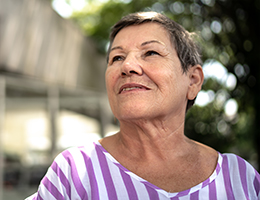
May 31, 2021—No one knows exactly what causes fibromyalgia. And there's no quick fix for this painful and disruptive disorder. But that doesn't mean it has to remain a total mystery.
Here are five facts about fibromyalgia from the National Institute of Arthritis and Musculoskeletal and Skin Diseases, the American Academy of Family Physicians and other experts.
1. Fibromyalgia can cause a variety of symptoms.
People with fibromyalgia have chronic muscle and joint pain throughout the body. Many of these areas may be tender to the touch. But the disorder does not damage muscle or joint tissues.
For many people, another problem is fatigue or low energy.
Other symptoms of fibromyalgia can include:
- Trouble sleeping.
- Difficulty thinking or remembering—sometimes called fibro fog.
- Numbness or tingling in the hands, arms or legs.
- Muscle stiffness, often felt in the morning.
2. It affects more women than men.
Anyone can get fibromyalgia, but it's more common in women. Symptoms usually start in midlife. Some people may develop fibromyalgia after stressful events, such as car crashes or illnesses.
And some people with fibromyalgia have a family history of the disorder. One possible explanation? Some researchers think people with fibromyalgia inherit a gene that makes their nervous system more sensitive to pain signals or other stimuli (such as pressure from touch, as well as lights and sounds).
3. It often goes hand-in-hand with other conditions.
Fibromyalgia often occurs alongside autoimmune diseases, like lupus and rheumatoid arthritis. But it is not a form of arthritis, nor is it an immune disorder.
It may also co-occur with:
- Depression.
- Headaches.
- Irritable bowel syndrome.
- Painful menstrual periods.
- Pelvic pain.
- Restless leg syndrome.
4. Getting a diagnosis can take time.
There are no tests for fibromyalgia, which can make getting a proper diagnosis challenging. Often, doctors need to rely on your symptoms to make a diagnosis. And other possible causes of your symptoms may have to be ruled out first.
5. Fibromyalgia can be managed.
While there is no cure, some treatments and lifestyle changes may help control the symptoms. Some options may include:
Medications. Prescription medicines for depression and seizures may help with fibromyalgia symptoms.
Complementary therapies. Massage, acupuncture or deep-breathing techniques, for instance, may offer relief.
Self-care. There are things you may be able to do to help manage fibromyalgia, such as:
- Exercise moderately. Taking walks throughout the week may help improve your pain, sleep and fatigue.
- Do your best to rest. Adopting healthy sleep habits may help you get better shut-eye.
- Eat well. There's no specific fibromyalgia diet. But a healthy, balanced diet may help keep your energy up.